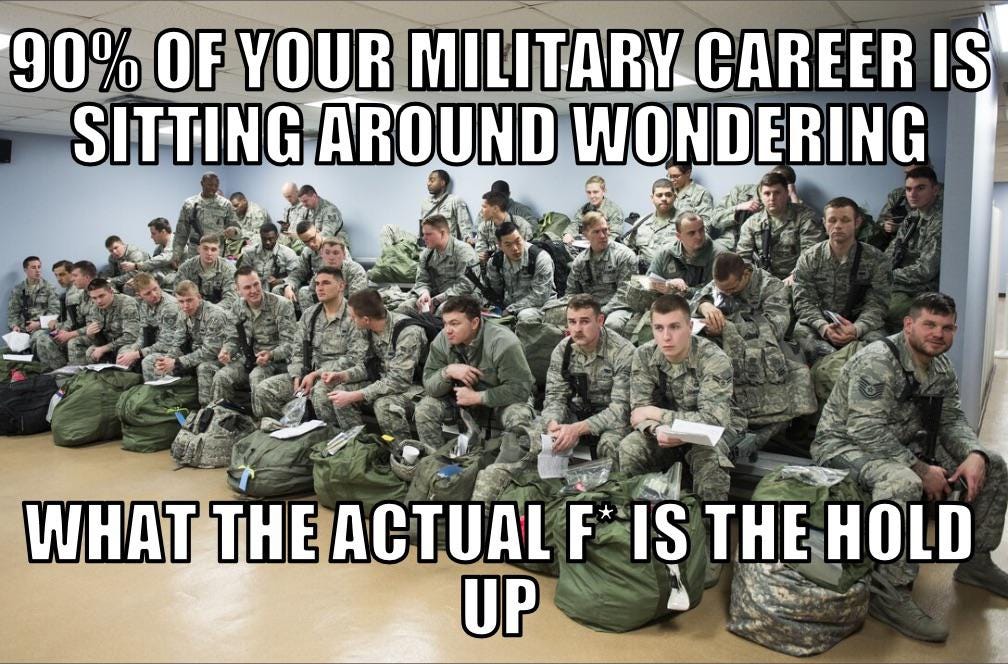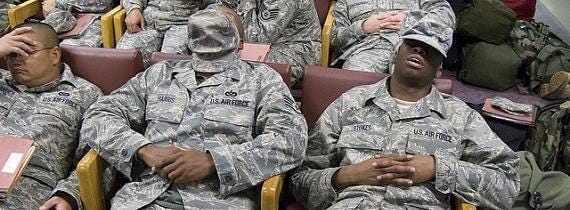The real cause of the military recruiting "crisis"
Military life kind of sucks - and for what, these days?
For several years now, the U.S. military has faced a recruiting and retention crisis, leaving it tens of thousands of volunteers short of its preferred force structure. It’s debatable whether the U.S. actually needs such a large fighting force, but let’s leave that aside for now and assume the crisis is real. There are many complicated reasons for this shortfall, including:
The civilian job market is strong.
COVID-19-era school closures reduced academic performance and opportunities for recruiters to meet prospective recruits in person.
Increased levels of obesity, mental health issues, and drug use (especially marijuana, which is now legal in 21 states) have reduced the portion of Americans deemed eligible to serve.
Gen-Z seems to have a reduced interest in military service, both from generational distrust in American institutions (they grew up in a political atmosphere of constant crisis and political theater) and from two decades of failed wars, capped by the chaotic withdrawal from Afghanistan.
The military is increasingly smeared in the media for political gain, mainly by Republicans with dumb theories about it going “woke,” but also partly by Democrats amplifying its problems with sexual assault and extremism.
All of this plays a role, and I won’t pretend there’s a silver bullet solution. But as someone who left the military myself in recent years, I can’t help but feel most commentary on the topic tiptoes around the heart of the issue. Most of the reasons listed above have a unifying theme.
The military is having a hard time keeping and attracting people because military life kind of sucks, in ways that are simply unappealing to people with moderately comfortable alternatives. This is especially so when the sacrifices involved feel futile or unnecessary, as the U.S. military’s missions have been for most of Gen Z’s lifetime.
If recruiters were honest with those they want to enlist, their sales pitch would sound something like this:
First, you’ll go through months of grueling, stressful, often painful training in which angry, ill-adjusted middle-aged men will constantly demean and yell at you.
Then, you get shipped off far from home to live on a gated military compound, where you’ll constantly be treated like a child with abusive helicopter parents.
Every day, you’ll wake up at 5 AM for an inefficient group workout, then race home to shower and eat breakfast before a 9-6 workday. There’s no remote work, of course: you’ll be in person, in a stuffy uniform. You eat lunch only when your boss gives permission, and food options are limited.
Your work itself is some combination of tedious, pointless, or frantic “hurry up and wait” because your higher ups either can’t get their shit together, don’t value your time at all, or both. You’ll sign lots of forms that lie about compliance with 5,000 obscure rules or regulations to cover your commander’s ass. You’ll go home everyday painfully aware of how none of it really matters, because the country’s exactly as safe today as it would be if your entire unit ceased to exist.
You can never really leave this work at the office, because you live with your coworkers in tiny barracks right next to your workplace. Furthermore, every aspect of your life outside work is micromanaged by your boss, from your facial hair to whether you’re allowed to ride a motorcycle.
At any point in time, your Sergeant can barge into your room unannounced to make you scrub the floors or make your bed. They can scream at you and smoke you to exhaustion on a whim. They can take away your Saturday unannounced for some absurd reason, like the vehicles in the motorpool not being perfectly aligned. You will have many weekend duties, overnight duties, and 24/7 training exercises that last for weeks or months.
You can’t leave post or travel outside a certain radius without permission from your boss. You may have an evening curfew; if you break it, it could kill your career. You get regularly drug tested, so you can’t smoke pot like everyone else in your generation, or it’ll kill your career. You can’t fail your PT test or it’ll kill your career. You’ll be taped for an arbitrary body fat percentage and if you fail it, it can kill your career.
The only people you interact with regularly are other servicemembers, who you’re usually not allowed to date or else it’s fraternization. It’s tough to even go out for a one-night stand, because you share a room with another servicemember and overnight guests are not permitted in the barracks. But if you’re a woman, you’re much likelier to be sexually assaulted than the population at large.
If you decide you hate this and want to quit, too bad: you’re legally obligated to do it for several more years, under penalty of imprisonment or a dishonorable discharge that makes you an embarrassment to your family and unemployable in the civilian sector. You feel trapped, on-edge, chronically fatigued, and constantly stressed that someone’s about to yell at you again for some unimportant nonsense that probably isn’t your fault. This is probably because they, too, are constantly tired and on edge. Most people around you are pretending to not be just as miserable.
Also, you might get sent to go kill people who are trying to kill you too. If recent history is any indication, this will have only an extremely tenuous connection to defending Americans from anything, and you probably won’t win any decisive or resounding victory that accomplishes anything important. The combat experience might traumatize you or give you difficulty readjusting to civilian life.”
Are we really mystified at why nobody’s down for this anymore? in 2024? For that matter, is it any wonder why military suicide rates are so high?
Poor quality of life is not just a retention problem. Word gets out, especially since so many recruits come from military families. A good article in War on the Rocks observes:
“[E]arly indications that fewer people in and around the military are willing to recommend military service to young people. In 2019, almost 75 percent of military families said they would recommend military service to someone they care about. Yet that figure dropped to just under 63 percent in 2021, another sharp decline in just two years. Since 80 percent of the young people who join the military today have a family member in the military — and 25–30 percent have a parent in the military — it may well be that more military families are steering their children away from uniformed service toward civilian careers.”
When any other large organization has persistent difficulty attracting or retaining talent, it is forced to introspect about what it’s doing wrong. Why don’t talented people want to work here? What does that say about us? What steps can we take to make our work environment more attractive?
So it’s infuriating to hear some military people deflect blame outward, as if kids these days are just too lazy, obese, or unpatriotic. Or worse, to hear them call on Congress to stem the bleeding with one or another form of conscription. Instead of taking a hard look in the mirror and making the needed reforms, they are crossing their arms and stamping their feet at the need for free societies to treat their citizens and servicemembers decently. If this makes someone seem entitled, it is not the kids they’re scolding.
What to do about it
My active-duty military experience began with two years in Korea, where enlisted Soldiers (who had it much harder than I did) were mostly miserable and couldn’t wait to go home. Then I spent two years in Florida with the 7th Special Forces group. And go figure, everyone there was much happier. You know why?
Because they’re treated like adults, and don’t have to deal with all the same bullshit as the rest of the Army. They work out on their own time. They show up to work in shorts and a T-shirt, and return to their off-post homes at 4ish, after working on relatively impactful things for a reasonable amount of time. The relationships between superiors and subordinates were much friendlier and healthier, even among non-Green Berets.
If you want to increase recruitment, start there: make the quality of life for the whole Army closer to what it is in the Special Forces. That means respecting people’s time and privacy, and giving them space to truly unplug for a healthy work/life balance. It means a sharper distinction between work and non-work hours, and less micromanaging how servicemembers can behave when they’re not at work. It means making it easier to quit without destroying your life. It means tossing out those parts of Army culture that feel like a relic of herding illiterate conscripts into hand-to-hand combat under penalty of death, and replacing them with a truly volunteer Army that will—yes—necessarily be kinder and gentler.
Some of these changes involve soft cultural norms that don’t change overnight. They will take time and patience. Others, though, are low-hanging fruit, like thinning the laundry list of irrelevant traits that currently render one unfit for service. I’m not saying we should lower standards where standards are actually important to defending our country (ex: physical fitness). I am saying we should eliminate arbitrary conservative prejudices dressed up as standards by judgmental old-timers.
The American people do not care if their servicemembers have tattoos—not even (gasp!) tattoos on their face. They do not care if they are unmarried parents. They do not care if they have facial hair, nor what style or color they prefer for their regular hair. The “hygiene” or “gas mask seal” arguments against these things are a paper-thin pretense for grouchy Cold War animosities against hippies or counterculture. When it comes to tolerance for the wide range of lifestyle and appearance preferences in our country, the military is 20 years behind the American public and probably 40 years behind Gen-Z. If you lament that such a small share of American youth “qualifies” for military service, do not hasten to blame that on the youth.
We should eliminate arbitrary conservative prejudices dressed up as standards by judgmental old-timers.
The lowest hanging of all these fruits is marijuana. About a third of American 18-year-olds admit they have used marijuana at least once in the past year.1 About two-thirds of Americans say pot should be legal for recreational use, and about 90% (!) say it should at least be legal medicinally. It’s already legal in almost half the country. Even longtime drug warrior Joe Biden is moving pot to Schedule III, in part because it appeals to young people whose support he (and clearly, the military) desperately needs. And as the War on the Rocks piece admits, “research has shown that Army recruits who received waivers for low levels of marijuana use in the past performed just as well as other soldiers.”
As long as the military insists on kicking people out for such a widespread and relatively harmless form of recreation, it is difficult for me to take their recruiting “crisis” seriously. It is especially difficult when I know, from years of experience, that the majority of our brave men and women in uniform get absolutely plastered every weekend. Alcohol is more addictive, dangerous, and unhealthy than pot, and there is zero reason to treat the drugs so differently.
Until the military exhausts these avenues to make voluntary service more appealing, suggestions to bring back the draft are morally outrageous. They also reflect the increasing detachment of our national security establishment from mainstream American values and concerns. And that’s where I return to the issue I tabled in the introduction. The alleged need for a draft is linked with whether we need such a massive military in the first place, which is in turn linked with polarizing questions of how that military ought to be used.
Only the blob thinks a military 2.9 million strong has a crisis-level shortage of volunteers, because only the blob defines our security interests so expansively beyond the direct safety and well-being of Americans. Though many root hard for global democracy, only the blob thinks drafting Americans to kill and die against their will is a sensible way to defend it in Taiwan or Iran or Estonia. Only the blob is so comfortable contravening liberal principles of free will for the ostensible purpose of saving them.
If the United States ever faces an imminent risk of invasion, I suspect there will be no shortage of volunteers to defend it. And if I’m wrong about that—if the nukes have run out, and enemies are massing at the border, and the survival of our country depends on putting more guns in more hands—you can feel free to call our military’s recruitment shortfall a “crisis.” Until then, spare me. The same hawks who squandered the sacrifices of a generation of eager volunteers by cheering and prolonging two decades of military debacles do not get to sneer at the next generation for the crime of knowing better. And they certainly don’t get to coerce them.
The true number is surely higher, since kids are reluctant to admit such things.






Who would want to serve a country that stands for nothing but power and money now? That has no moral values any longer? The problem will be worse now than when you wrote this.
Even as a military veteran, I’ll be damned if I allow my sons to volunteer to get shipped off to one of our empire’s endless, idiotic colonial wars that are so unimportant that Congress never even bothers to declare war.